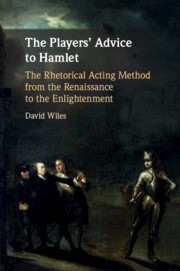 The Players' Advice to Hamlet
The Players' Advice to Hamlet Book contents
- The Players’ Advice to Hamlet
- The Players’ Advice to Hamlet
- Copyright page
- Contents
- Illustrations
- Acknowledgements
- Introduction
- Chapter 1 Hamlet’s Advice to the Players
- Chapter 2 Rhetorical Performance in Antiquity
- Chapter 3 Acting, Preaching and Oratory in the Sixteenth Century
- Chapter 4 Baroque Acting
- Chapter 5 Actors and Intellectuals in the Enlightenment Era
- Chapter 6 Emotion
- Chapter 7 Declamation
- Chapter 8 Gesture
- Chapter 9 Training
- References
- Index
Chapter 9 - Training
Published online by Cambridge University Press: 16 January 2020
- The Players’ Advice to Hamlet
- The Players’ Advice to Hamlet
- Copyright page
- Contents
- Illustrations
- Acknowledgements
- Introduction
- Chapter 1 Hamlet’s Advice to the Players
- Chapter 2 Rhetorical Performance in Antiquity
- Chapter 3 Acting, Preaching and Oratory in the Sixteenth Century
- Chapter 4 Baroque Acting
- Chapter 5 Actors and Intellectuals in the Enlightenment Era
- Chapter 6 Emotion
- Chapter 7 Declamation
- Chapter 8 Gesture
- Chapter 9 Training
- References
- Index
Summary
Can you teach someone to be an actor? Paradoxically, the French cultural context while constraining the remit of the actor allowed acting to emerge as an autonomous science. The conservatoire training model that flourished in France in the nineteenth century was vigorously resisted by the nineteenth-century English actor-manager. Training or talent: the classical debate: Cicero and Quintilian resisted Aristotle’s claim that acting was merely ‘natural’. Early modern apprenticeship in the science of acting: our best evidence comes from Paris in the Shakespearean era, where Hardy’s classical dramaturgy demanded new skills. Multiple skills served the craft of acting. Early modern schooling: the example of Marston’s boy actors: how boys with a rhetorical education challenged the older generation of professionals. Hamlet: fencing as a foundation for acting: Hamlet learns to ‘act’ by learning to fence, and I trace the enduring place of fencing in actor training, distinguishing Italian and English methods. The pedagogy of Charles Macklin: a case study in how eighteenth-century acting was taught. The birth of the conservatoire: first championed by Lekain and his contemporaries.
- Type
- Chapter
- Information
- The Players' Advice to HamletThe Rhetorical Acting Method from the Renaissance to the Enlightenment, pp. 301 - 334Publisher: Cambridge University PressPrint publication year: 2020


